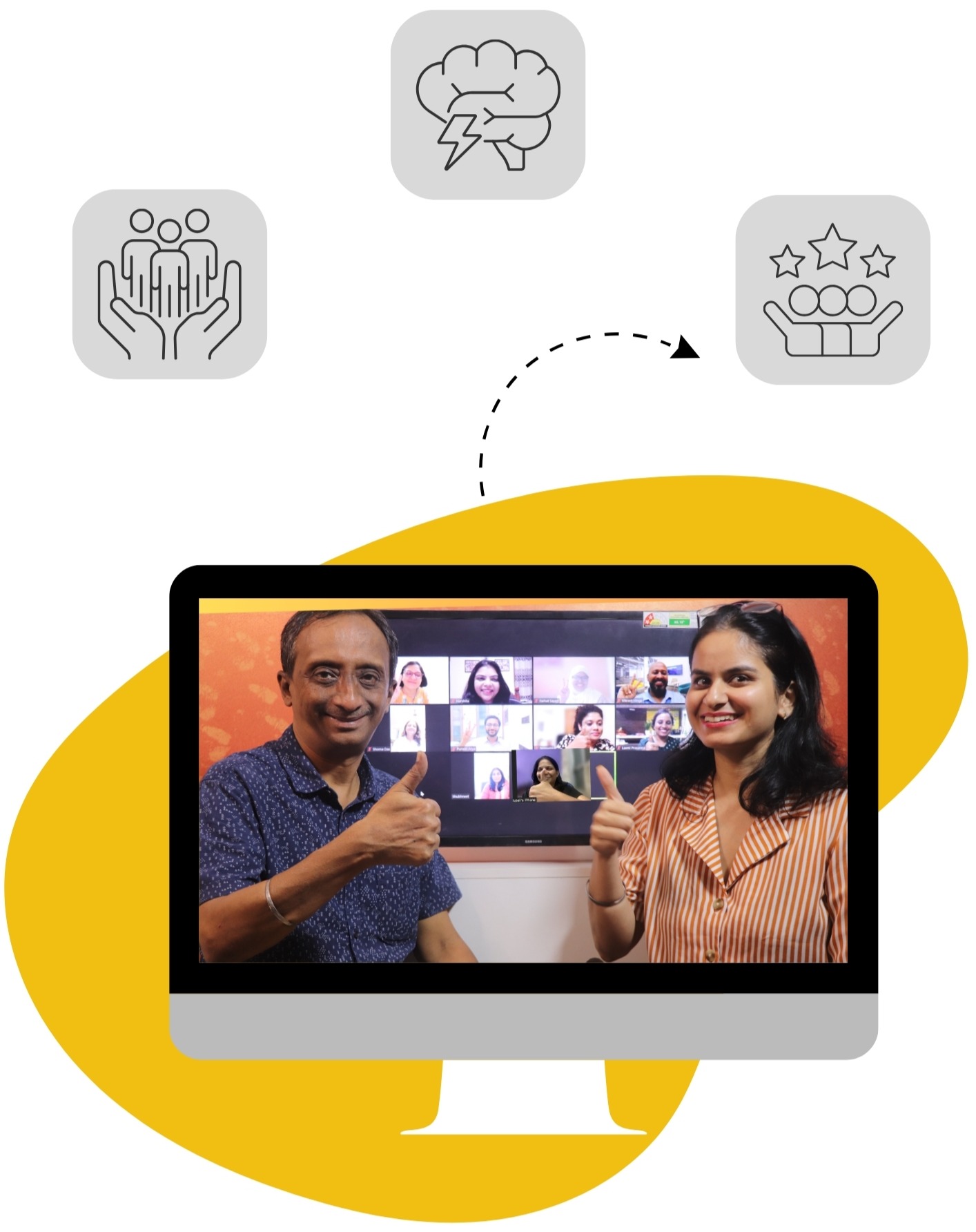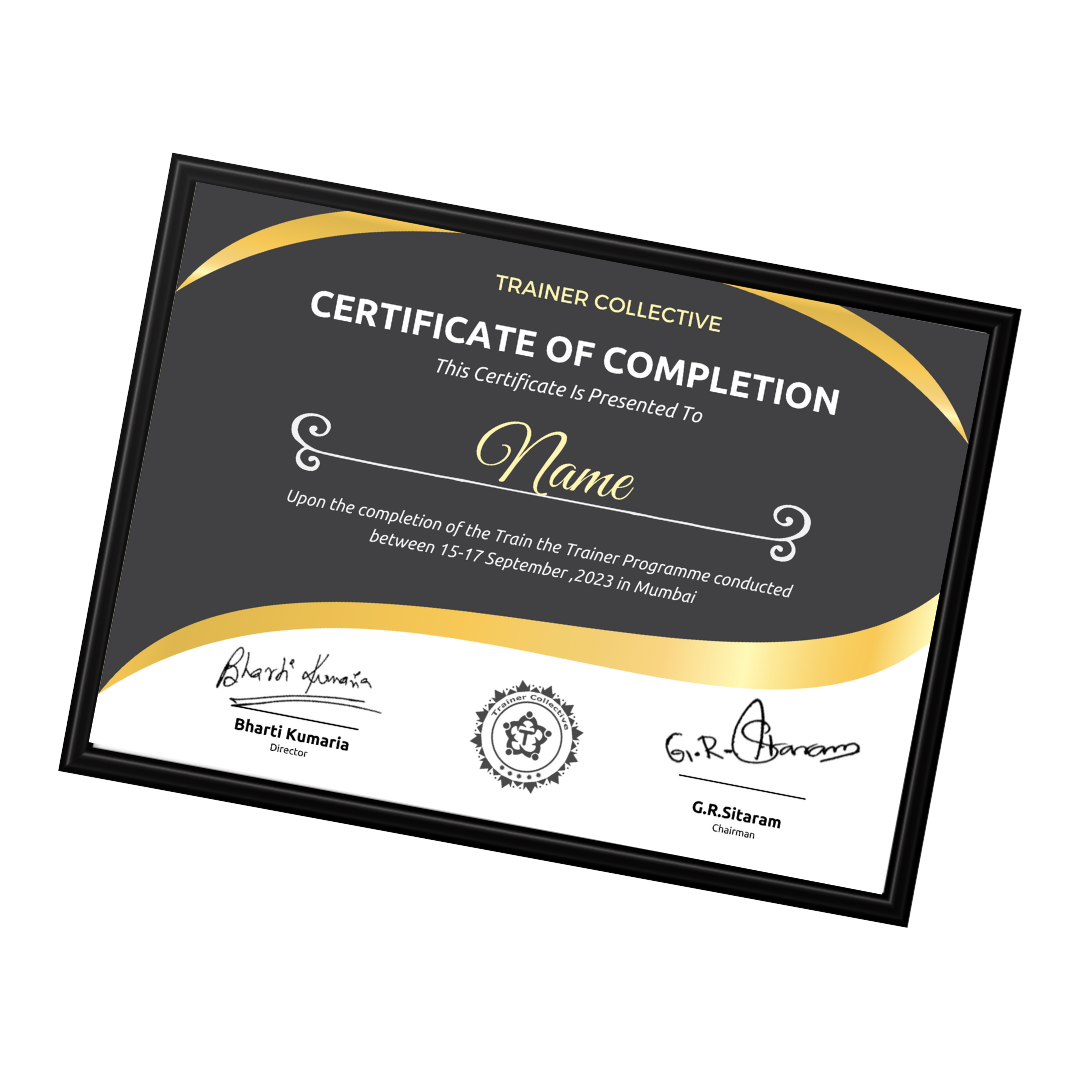
Master the Art of Training Unlock Your Potential as a Master Trainer
Next cohort starts :
04–05 October 2025, 11–12 October 2025
(11:00 AM–3:00 PM IST)
Master the Art of Training
Unlock Your Potential as a Master Trainer
Next cohort starts :
04–05 October 2025, 11–12 October 2025
(11:00 AM–3:00 PM IST)
1. Do you envision yourself guiding individuals and teams toward achieving ‘their’ personal and professional goals?
2. Are you looking for a rewarding career that not only fuels your passion for personal growth but also provides a sustainable source of income.
3. Are you considering a career shift or enhancement that aligns with your desire to empower others?
If yes, then our Master the Art of Training programme is the perfect springboard for your journey.
Why Become a Trainer ?

Impactful Contribution:
Continuous Learning:
Versatility and Transferable Skills:
Leadership Development:
Job Satisfaction:
Entrepreneurial Opportunities:
Why Us ?
Practical Certification Process
Practical Certification Process
Seasoned Training Expertise of 20 years
Seasoned Training Expertise of 20 years
Proven Track Record of 1000 certified trainers and 100 trusted corporate clients
Proven Track Record of 1000 certified trainers ,100 trusted corporate clients
Comprehensive Resource Support
Comprehensive Resource Support
Dynamic Learning Community of over 5000 individuals
Dynamic Learning Community of over 5000 individuals
Programme outline
Introduction to Training
- Importance of effective training
- Roles & Responsibilities of Trainers
- Adult Learning Principles
- Training Need Analysis
Training Design and Development
- Setting Training Objectives
- Identifying target audience and learning styles
- Learning Styles of Questionnaire – Honey and Mumford (1992)
- Manual of Learning Styles
- The Learning Style Inventory – The Kolb’s Model (1984)
- Designing training materials and activities
Adapting to Diverse Audience
- Understanding Audience Mindset
- Participants who speak English as a second language
- Participants with Disabilities
- Interacting with different Generational Levels
- Creating an inclusive and respectful training environment
Dealing with Behavioural/Attitude Issues
- Understanding the different types of Participants
- Listeners /Monopolizers /Shy
- Strategies for managing ‘difficult’ behaviors or resistance to training
- Active listening and conflict resolution techniques
Instructional Techniques and Delivery
- Effective presentation skills
- Facilitating group discussions
- Using interactive and participatory methods
- Using the power of Storytelling to leave an indelible mark
Introduction to Learning Styles
- Experiential Learning Cycle
- Relationship between Learning Styles and Five levels of Behaviour
- Kirkpatrick Model of Training Evaluation
- Blooms Taxonomy
- Personalizing Learning Experiences
The Basics of Designing Training Programs
- What is design for training
- Basic principles of training design
- The ADDIE Approach to instructional design
- The basics of planning a training project
- The basic information needed to start a project
The Instructional Objective
- The Basic Value of Objectives and Evaluation
- Establishing Objectives
- Drafting the Evaluations
- Presenting the Evaluations
- Platinum, Silver, and Bronze Types of Projects
Choosing an Instructional Strategy
- Characteristics of an Engaging Training Program
- Four Common Instructional Strategies for Presenting Material
- Choosing an Instructional Strategy
- Presenting Design Plans
The Basics of Developing Instructional Materials
- Preparing Materials for Live Training Programs
- Preparing Materials for Self-Study Programs
- Preparing Common Parts of Training Programs
- Preparing Instructional Materials
- Online facilitation and virtual training best practices
Quality Check for Training Programs
- What is Formative Evaluation?
- The basic types of Formative Evaluation
- Revising The Training Program
- Closing a Design and Development Project
- How to make SOPs and training commercials
Marketing Yourself as a Trainer
- Understanding Your Target Audience
- Defining Your Unique Value Proposition
- Building Your ‘Personal’ Brand
- Developing Marketing Materials
- Creating an Online Presence
- Client Relationship Management
How this program benefits you ?
Showcase
Check out our latest projects
Bonuses for Enhancing Your Marketing
and Promotion Skills as a Trainer
In today’s competitive landscape, it’s not enough to be a great trainer; you must also be adept at marketing and promoting your services to stand out and attract clients. Here’s why our exclusive bonuses in the “Train the Trainer” program are crucial for your success.
Custom-Built WordPress Profile
Importance
LinkedIn Optimization
Importance
Social Media Campaigns
Importance
Content Creation Tools
Importance
Custom-Built WordPress Profile
Importance
LinkedIn Optimization
Importance
Social Media Campaigns
Importance
Content Creation Tools
Importance
Become a certified Train the Trainer practitioner
They don’t just guide you as to how to become a good and effective Trainer ,but actually help you kickstart your training journey as well.They helped promote me on their platform and I was also able to get few training assignments through them .Shadowing the head trainers is also a great experience as it teaches you the do’s and dont’s of Training as a profession .A complete value for money .
Radhika S, L&D Manager, Bangalore

Watch what our participants have to say
Who Should Attend ?
















